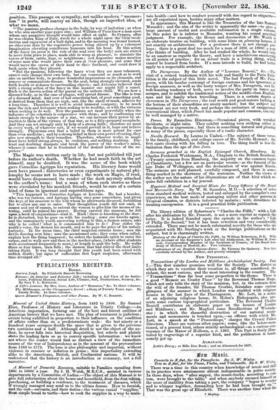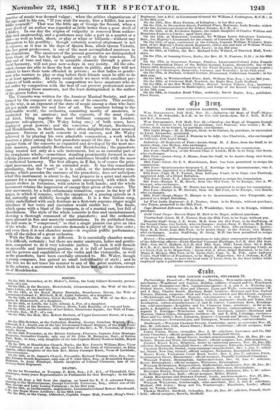riu MUSit.
Concerto in Efiat, for the Pianoforte. By S. W. Waky.
Trio in B fiat, for the Piano, Violin, and Violoncello. By S. W. Iraisa.
There was a time in this country when knowledge of music and skill in its practice were attainments almost indispensable in polite society. In those days, when " after supper, the music-books, according to cus- tom, were brought to the table," and when anybody excused himself on the score of inability from taking a part, the company " began to wonder and to whisper together, demanding how he had been brought up."* That was the great age of Elizabeth. There was another time when the
• Morley.
rimer:ice of music was deemed vulgar; when the arbiter elegantiarum of the age.said to his son, If you wish for music, hire a fiddler, but never fiddle yourself?. That was the little age of George the Second, when a poor devil of an author was regarded as little better than a poor devil of a fiddler. In our day the stigma of vulgarity is removed from author- ship and iiatiteurship, and a gentleman may take a part in a quartet or a glee-as well as hunt, shoot, or play at whist or billiards-without any derogation to his gentility ; though certainly musical attainment is not dc-rigueur, as it was in the days of Queen Bess, albeit Queen Victoria, like her great predecessor, is one of the most accomplished amateurs in her dominions. The amateurs of the present generation are distinguished from thosh of the last by their quality as well as their numbers. To /day out of tune and time, or to scramble clumsily through a piece of Tod harmony, will not pass now-a-days in any society. All the edu- cated classes are able to hear the best music in public, and they will not submit to have their taste offended in private ; so that ladies or gentle- men who venture to play or sing before their friends must be able to do so at least agreeably. In every social circle we meet with excellent per- formers of both sexes; while in composition we have amateurs who do not suffer by comparison with the best of our present professional musi- cians. Among those amateurs, not the least distinguished is the author Of the pieces before us. The Concerto was written for the Amateur Musical Society, and per- formed by the composer at more than one of its concerts. This society, by the way, is .an exponent of the state of music among a class who have not got much credit for real love of art. The members belong to the fashionable world; the orchestra, consisting mostly of amateurs, is conducted by.. an amateur; and the concerts, of the most classi- cal kind, bring together the most.brilliant company in London. Amateur solo-players, (Mr. Waley being one,) of both sexes, have displayed, powers ; and the concertos of Mozart, Beethoven, and Menelssohn, in their hands, have often delighted the most musical listeners. Success at such concerts is real success, and Mr. Waley achieved it by playing his own admirable composition, a work which deserves a place among the best pianoforte music of the day. It is in the regular form of the concerto as expanded and developed by the most mo- dern masters, particularly Beethoven and Mendelssohn ; the pianoforte being treated not only as a solo instrument, but as an essential part of the symphonic whole,-sometimes standing prominently forward in me- lodious phrases and florid passages, and sometimes blended with the mass of orchestral harmony. The first allegro, in E flat, is of course the prin- cipal movement, and is on an extended scale. It has this remarkable peculiarity, that the " tutti" as it is called, or the introductory sym- phony, which precedes the entrance of the pianoforte, does not anticipate what this instrument is about to do, but prepares in a quiet and smooth manner for a most vigorous passage, quite unexpected, with which the pianist strikes in fortissimo, with octaves in both hands; and the whole movement retains the impression of energy thus given at the outset. The slow movement, by a bold enharmonic transition, opens in the key of B major, in which it remains, with the exception of a passing episode in A fiat, naturally and skilfully brought about. It is a fine Italian song, richly embellished with such floriture as a first-rate soprano singer might introduce if her voice and execution would enable her. The finale, which opens with a blast of the trumpets, is of a martial cast, but full of cheerfulness. The style of the whole concerto is free and unembarrassed, showing a thorough command of the pianoforte ; and the orchestral parts abound in fine and masterly combinations. In its published form, the full score is " compressed," so that a single pianist can give an idea of the whole. But a great concerto demands a Player of the first order; and even then it is not chamber music-it requires public performance, with all the riches of a great orchestra.
With the Trio the case is different. It is essentially chamber music. It is difficult, certainly; but there are many amateurs, ladies and gentle- men, competent to do it very tolerable justice. To such it will furnish an agreeable and interesting pastime, as it is full of beautiful things ; and the powers and capabilities of the violin and the violoncello, as well as the pianoforte, have been carefully attended to. Mr. Waley, though a young composer, has gained no small individuality of style-; and in this trio we do not trace his manner to any of the great masters, except
in the scherzo, a movement which both in form • nit is characteris- tic of Mendel;sohn.



























 Previous page
Previous page